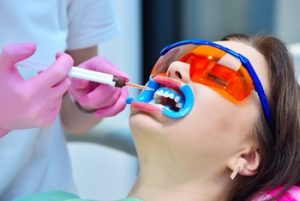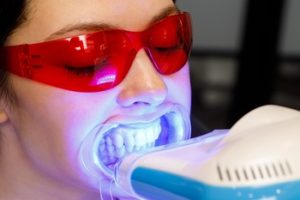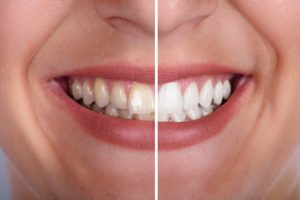In the quest for a dazzling white smile, teeth whitening has surged in popularity across Australia. Hydrogen peroxide teeth whitening is a highly sought-after solution among the myriad options available. This blog dives deep into hydrogen peroxide, exploring its benefits, risks, and everything to give you a clearer picture of this popular whitening method.
Understanding Hydrogen Peroxide

Chemical Properties and Mechanisms
Hydrogen peroxide is water (H2O) with an extra oxygen atom, creating a simple yet highly reactive molecule. This additional oxygen atom allows hydrogen peroxide to act as an oxidising agent, breaking down the chemical bonds of the molecules that cause stains on tooth enamel. When applied to the teeth, hydrogen peroxide penetrates the porous outer layer of the enamel, reaching the discoloured molecules inside and altering their structure to lighten the teeth’s appearance.
Concentrations in Teeth Whitening Products
The concentration of hydrogen peroxide found in teeth whitening products can vary significantly, influencing both the effectiveness and safety of the whitening treatment. Over-the-counter products typically contain lower concentrations of hydrogen peroxide (ranging from 3% to 10%) to minimise the danger of gum irritation and tooth sensitivity.
Professional whitening treatments, on the other hand, may use higher concentrations (up to 40%) for more immediate and pronounced results. The hydrogen peroxide concentration is a critical factor in determining the method’s whitening potential and the duration of the treatment.
Safe Use and Regulatory Guidelines
Given its chemical potency, the use of hydrogen peroxide for teeth whitening is subject to regulatory guidelines to ensure consumer safety. Products designed for home use are formulated with lower concentrations of hydrogen peroxide and are intended for short-term application.
It’s important for users to follow the product instructions carefully and to consider the duration of exposure to hydrogen peroxide, as overuse can lead to enamel damage or increased tooth sensitivity.
In professional settings, dental practitioners are trained to safely use higher concentrations of hydrogen peroxide, applying protective measures to the gums and surrounding tissues to prevent irritation. The controlled application in a dental office maximises the whitening benefits while minimising potential risks.
Role in Oral Hygiene Beyond Whitening
Beyond its teeth-whitening capabilities, hydrogen peroxide is valued for its antiseptic properties. It can help kill bacteria and disinfect the oral cavity, contributing to oral health. Some mouthwash products contain low concentrations of hydrogen peroxide to aid in reducing bacteria and freshening breath, showcasing its versatility beyond merely cosmetic applications.
The Science Behind Hydrogen Peroxide Teeth Whitening

Oxidative Action on Tooth Stains
Hydrogen peroxide’s ability to whiten teeth stems from its strong oxidative properties. It breaks down into water and free oxygen radicals when applied to the teeth. These highly reactive oxygen radicals interact with the stained molecules trapped within the tooth enamel, tearing the chemical bonds that hold the stains together.
This reaction alters the molecular structure of the stains, causing them to become less concentrated and, consequently, less visible. This process addresses surface stains and can penetrate deeper into the enamel to treat discolouration beneath the surface, making hydrogen peroxide a powerful agent for whitening teeth.
Impact on Different Types of Stains
Teeth can become stained or discoloured for different reasons, including diet (coffee, tea, and red wine), tobacco use, certain medications, and ageing. These factors contribute to two main types of tooth stains: extrinsic and intrinsic.
Extrinsic stains appear on the teeth’ surface, while intrinsic stains are found within the tooth enamel. Hydrogen peroxide is particularly effective against extrinsic stains but also can lighten intrinsic discolouration to some degree. Its versatility in addressing both stains makes it a popular choice for those seeking comprehensive teeth whitening solutions.
Concentration and Treatment Time
The quantity of hydrogen peroxide used in whitening treatments plays a critical role in the effectiveness and safety of the process. Lower concentrations, as found in over-the-counter teeth whitening products, require longer treatment times but are generally safer for at-home use.
Higher concentrations in professional whitening treatments offer faster results but must be managed carefully to avoid harming the tooth enamel or causing gum irritation. The balance between concentration and exposure time is essential for maximising the whitening effect while minimising potential side effects.
Safety and Efficacy Considerations
While hydrogen peroxide is effective in whitening teeth, its application must be approached carefully to prevent adverse effects. Excessive use or excessive concentrations can cause tooth sensitivity and damage the enamel surface.
Furthermore, it’s important to consider that not all tooth discolouration can be addressed with hydrogen peroxide. For example, discolouration due to dental restorations or certain medications may not respond to traditional whitening treatments. Understanding these limitations is crucial for setting realistic expectations and achieving satisfactory results.
Benefits of Hydrogen Peroxide Teeth Whitening
Hydrogen peroxide teeth whitening is a beacon for those seeking a luminous smile, thanks to its robust bleaching properties. This method shines for its ability to whiten teeth and its versatility and accessibility, offering many benefits to those wishing to enhance their oral aesthetics.
 Efficacy in Whitening Teeth
Efficacy in Whitening Teeth
One of the most compelling advantages of using hydrogen peroxide to whiten teeth is its proven efficacy. The chemical’s ability to penetrate the tooth enamel and break down the discoloured molecules contributing to stains is unparalleled.
Whether dealing with surface stains from coffee and red wine or deeper discolouration, the right hydrogen peroxide concentration can transform teeth to several shades brighter. This makes it a highly sought-after component in various teeth whitening methods, including professional treatments and at-home kits.
Versatility and Compatibility
Hydrogen peroxide’s versatility extends to its compatibility with other whitening agents, such as carbamide peroxide. Carbamide peroxide tears down into hydrogen peroxide and urea upon application, offering a slower release of the bleaching agent, making it an excellent option for individuals with sensitive teeth. This synergy between hydrogen and carbamide peroxide allows for a range of tooth-whitening products tailored to different needs and sensitivities, ensuring a suitable option for nearly everyone.
Oral Health Benefits
Beyond merely whitening teeth, hydrogen peroxide offers additional benefits for oral health. Its antiseptic properties can help to kill bacteria, decreasing the risk of gum disease and bad breath. However, it’s important to use it correctly to avoid potential side effects like gum irritation. Hydrogen peroxide can contribute to a healthier oral environment, complementing your oral hygiene routine when used judiciously.
Cost-Effectiveness and Accessibility
Compared to other teeth whitening methods, hydrogen peroxide-based treatments offer a cost-effective solution for improving your smile. With various products featuring different concentrations of hydrogen peroxide, individuals can choose the most suitable option without incurring the high costs of professional dental treatments. This accessibility encourages regular maintenance of a bright smile, contributing positively to one’s overall appearance and confidence.
Minimising Tooth Sensitivity
For those concerned about tooth sensitivity, the adaptability of hydrogen peroxide concentrations plays a crucial role. Lower concentrations can mitigate the sensitivity risk, providing a gentler approach to tooth whitening. This adaptability ensures that even those with sensitive teeth can explore hydrogen peroxide teeth whitening, enjoying the benefits of a brighter smile without discomfort.
Risks and Considerations
While hydrogen peroxide teeth whitening is generally safe, it’s not without its potential side effects. Tooth sensitivity and gum damage are among the most common concerns, particularly with higher concentrations of hydrogen peroxide or improper use. It’s crucial to adhere to product instructions and consider professional guidance to mitigate these risks.
How to Utilise Hydrogen Peroxide for Teeth Whitening
Hydrogen peroxide has garnered acclaim for its ability to whiten teeth, offering a beacon of hope for those seeking a brighter smile. Its application in teeth whitening varies, from professional treatments to at-home remedies. Understanding how to use hydrogen peroxide safely and effectively is paramount to achieving desired results while preserving oral health.
 Professional Whitening Treatments
Professional Whitening Treatments
Professional whitening treatments often utilise higher concentrations of hydrogen peroxide, providing dramatic results under the supervision of a dental professional. These procedures typically involve the application of a hydrogen peroxide gel to the enamel surface, followed by using a light or laser to enhance the whitening process. This controlled environment ensures the safety and effectiveness of the whitening treatment, minimising the risk to the enamel surface and surrounding tissues. Additionally, dental professionals can assess the compatibility of the treatment with any dental restorations you may have, ensuring that the outcome is both aesthetically pleasing and uniform.
At-Home Whitening Methods
For those preferring at-home solutions, there are several techniques to use hydrogen peroxide to whiten teeth:
Whitening Toothpaste: Many toothpastes incorporate hydrogen peroxide for their whitening properties. Regular whitening toothpaste can gradually remove surface stains and brighten the smile. It’s a convenient and gentle option, suitable for daily use, and can maintain the results of a professional whitening treatment or act as a standalone method.
DIY Hydrogen Peroxide Rinse: A homemade mouthwash can be created by diluting hydrogen peroxide with water (typically 1:1). Swishing this solution around the mouth for a minute before brushing can help whiten teeth and kill bacteria. However, it’s crucial to avoid swallowing the mixture and to limit its use to a few times a week to prevent irritation.
Direct Application: A small amount of hydrogen peroxide can be applied directly to the teeth using a cotton swab for targeted whitening. This method should be used sparingly, focusing on areas with noticeable discolouration. After application, brushing with regular toothpaste will remove any residual peroxide.
Considerations for Sensitive Teeth and Dental Restorations
Individuals with sensitive teeth should cautiously approach hydrogen peroxide whitening. Lower concentrations and shorter application times can reduce the risk of sensitivity. Additionally, it’s important to note that hydrogen peroxide may not alter the colour of dental restorations, such as fillings and crowns. Consulting with a dental professional can provide consultancy tailored to your dental health needs and aesthetic goals.
Conclusion
Hydrogen peroxide teeth whitening presents a viable option for brightening their smile. Its effectiveness, coupled with its availability, makes it a popular choice. However, it’s important to proceed cautiously, balancing the desire for whiter teeth with the need to protect your oral health. Consulting with a dental professional can provide tailored advice, ensuring your path to a brighter smile is safe and effective.
Have you tried hydrogen peroxide teeth whitening or have questions about the process? Share your experiences and queries in the comments below. For personalised advice, consider scheduling a consultation with a dental professional. And remember to subscribe for more insightful health and wellness tips.
If you’re considering hydrogen peroxide teeth whitening or exploring your teeth whitening options, Finesse Dental is here to guide you through every step. Our team of dental professionals is dedicated to ensuring your smile is not only beautiful but healthy, too. Don’t let uncertainty hold you back from achieving the radiant smile you deserve. Contact Finesse Dental today at (02) 8806 0790 to schedule your consultation and take the first step towards a brighter, more confident you.
References:
https://www.medicinenet.com/how_long_for_hydrogen_peroxide_to_whiten_teeth/article.htm
https://www.health.com/condition/oral-health/is-it-safe-to-use-hydrogen-peroxide-to-whiten-teeth


 Efficacy in Whitening Teeth
Efficacy in Whitening Teeth Professional Whitening Treatments
Professional Whitening Treatments